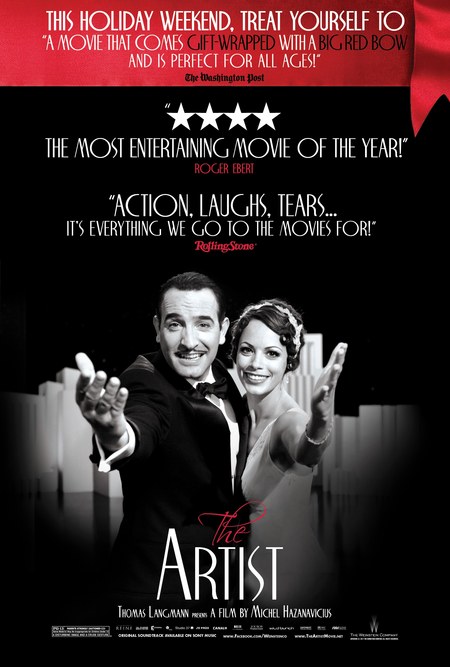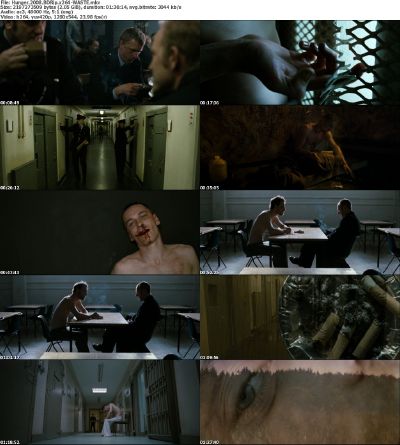This is such a lovely movie.
Leave it to a French director to re-create the joy of classic Hollywood, silent-cinema with enough modern twists to keep it fresh and interesting.
Joyous is the one word that keeps coming to mind, and that shouldn't be surprising since there's an adorable Jack Russell Terrier in nearly every scene, let alone every shot.
The film follows the fall of a silent era star and the parallel rise of a new 'it' girl and then they fall in love. Singular periods of darkness and an interesting examination of the loss of purpose when faced with creative failure and loneliness keep the film from being too fluffy and generic. And the finale wraps the challenges and sadness up with a glorious bow and dancing! It's delightful!
Ramblings on film, Netflix and all the pretty moving lights and sounds that accompany them
Wednesday, February 1, 2012
Hunger (2008) - % % % % %
This may be the best English language film I've seen in years.
"Hunger" is about hunger, literal and figurative. It tells stories surrounding the 1981 hunger strike in the prisons of Belfast, Northern Ireland. The many sides of hunger are present in these men's lives, starting with the simple breakfast of a guard, readying himself for his day at work, to the extremes of starvation experienced by the prisoners. There is the metaphorical hunger for freedom and the aspiration to greater lives desired by the IRA members, as well as the gnawing, aching growl which pervades everyone's existence at the prison.
I was unprepared for how beautiful and thoughtful this film is. It is brilliantly directed, by British artist Steve McQueen (not that Steve McQueen), with extraordinary intention throughout.
As an audience member, I feel I must warn some potential viewers that parts of the film are stomach churning. I do not think that one should turn away from any part of the human experience, especially since this is not a documentary and the thin veil of illusion ought to be enough to protect an audience from true trauma. But as I get older, I do occasionally wish I could extricate certain images and experiences from my mind. "Salo" often comes to mind. "Hunger" does not contain anything too violently graphic for contemporary audiences, but it may be upsetting to those with weak stomachs. Prison apparently may lead men to be resourceful and to use their basic materials in graphic ways to reject the means of their imprisonment. It's raw and the thought of it makes my eyes water.
I want to memorize the film. The shots are precise and potent. It's reminiscent of Antonioni in the framing, creating a feeling of alienation and abstraction from observing crumbs on a napkin or a car door opening. The times of the film are ominous and the direction draws out the violence and trauma implicit in every moment. Camera movement is judicious and, when used, infuses an operatic and hallucinatory tenor to the scenes.
I can't say enough. I feel like attempting to review this film and do it justice would involve spelling out every single frame of the film.
The acting is amazing. Michael Fassbender is so potent and charismatic that even in a near death state, practically comatose, he compels the viewer to observe the slightest movements of his facial muscles and the pace of his breathing for signs or indications of what he's thinking and experiencing.
Bravo, Steve McQueen. When I saw your Turner Prize winning piece, I never imagined you would develop such an extraordinary prowess with the medium. Bravo.
"Hunger" is about hunger, literal and figurative. It tells stories surrounding the 1981 hunger strike in the prisons of Belfast, Northern Ireland. The many sides of hunger are present in these men's lives, starting with the simple breakfast of a guard, readying himself for his day at work, to the extremes of starvation experienced by the prisoners. There is the metaphorical hunger for freedom and the aspiration to greater lives desired by the IRA members, as well as the gnawing, aching growl which pervades everyone's existence at the prison.
I was unprepared for how beautiful and thoughtful this film is. It is brilliantly directed, by British artist Steve McQueen (not that Steve McQueen), with extraordinary intention throughout.
As an audience member, I feel I must warn some potential viewers that parts of the film are stomach churning. I do not think that one should turn away from any part of the human experience, especially since this is not a documentary and the thin veil of illusion ought to be enough to protect an audience from true trauma. But as I get older, I do occasionally wish I could extricate certain images and experiences from my mind. "Salo" often comes to mind. "Hunger" does not contain anything too violently graphic for contemporary audiences, but it may be upsetting to those with weak stomachs. Prison apparently may lead men to be resourceful and to use their basic materials in graphic ways to reject the means of their imprisonment. It's raw and the thought of it makes my eyes water.
I want to memorize the film. The shots are precise and potent. It's reminiscent of Antonioni in the framing, creating a feeling of alienation and abstraction from observing crumbs on a napkin or a car door opening. The times of the film are ominous and the direction draws out the violence and trauma implicit in every moment. Camera movement is judicious and, when used, infuses an operatic and hallucinatory tenor to the scenes.
I can't say enough. I feel like attempting to review this film and do it justice would involve spelling out every single frame of the film.
The acting is amazing. Michael Fassbender is so potent and charismatic that even in a near death state, practically comatose, he compels the viewer to observe the slightest movements of his facial muscles and the pace of his breathing for signs or indications of what he's thinking and experiencing.
Bravo, Steve McQueen. When I saw your Turner Prize winning piece, I never imagined you would develop such an extraordinary prowess with the medium. Bravo.
Subscribe to:
Comments (Atom)



